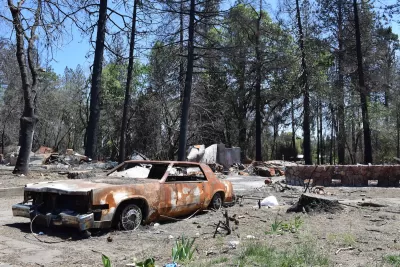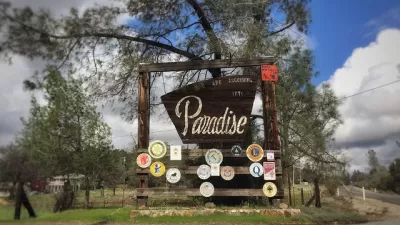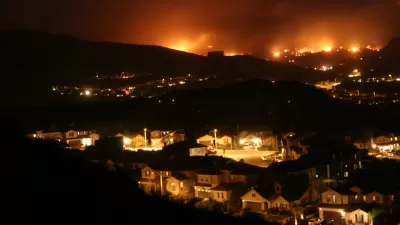The California community lost 85 lives and tens of thousands of homes. Now, high housing and rebuilding costs are forcing many former residents out.

Five and a half years ago, the town of Paradise, California burned in a devastating wildfire that killed 85 people. Today, many former residents are finding it hard to go home, displaced by deeper-pocketed transplants, wrrites Sam Mauhay-Moore in SF Gate.
“For three years in a row, data from California’s Department of Finance marks Paradise as the fastest-growing town in California. The town grew by 16.1% in 2023 (for reference, Lathrop, the state’s second-fastest-growing town, grew by only 5.4%).” And while that growth only represents 1,500 people, the change is dramatic for the small community.
“[Real estate broker Warren Bullock] puts the median price of a home in Paradise at about $450,000, a stark difference from the state’s median home price of over $900,000. But those prices are still too high for many pre-fire residents to afford, and the cost of rebuilding what they lost is also often out of reach.”
Local ordinances prohibit living in tiny houses or motor homes on residential lots, eliminating affordable housing options. Meanwhile, home insurance rates skyrocketed after the fire, a problem common across the state.
For its part, Paradise is on the road to recovery, repaving roads, undergrounding power lines, and building a new sewer line. The Camp Fire Restoration Project is using permaculture principles to restore the land in the area and make it more resilient through tree giveaways, composting workshops, soil health projects, and other efforts.
FULL STORY: In a California town destroyed by wildfire, locals are priced out by city transplants

Planetizen Federal Action Tracker
A weekly monitor of how Trump’s orders and actions are impacting planners and planning in America.

Congressman Proposes Bill to Rename DC Metro “Trump Train”
The Make Autorail Great Again Act would withhold federal funding to the system until the Washington Metropolitan Area Transit Authority (WMATA), rebrands as the Washington Metropolitan Authority for Greater Access (WMAGA).

DARTSpace Platform Streamlines Dallas TOD Application Process
The Dallas transit agency hopes a shorter permitting timeline will boost transit-oriented development around rail stations.

The Tiny, Adorable $7,000 Car Turning Japan Onto EVs
The single seat Mibot charges from a regular plug in about as much time as an iPad, and is about half the price of an average EV.

Supreme Court Ruling in Pipeline Case Guts Federal Environmental Law
The decision limits the scope of a federal law that mandates extensive environmental impact reviews of energy, infrastructure, and transportation projects.

Texas State Bills to Defund Dallas Transit Die
DART would have seen a 30% service cut, $230M annual losses had the bills survived.
Urban Design for Planners 1: Software Tools
This six-course series explores essential urban design concepts using open source software and equips planners with the tools they need to participate fully in the urban design process.
Planning for Universal Design
Learn the tools for implementing Universal Design in planning regulations.
Roanoke Valley-Alleghany Regional Commission
City of Mt Shasta
City of Camden Redevelopment Agency
City of Astoria
Transportation Research & Education Center (TREC) at Portland State University
US High Speed Rail Association
City of Camden Redevelopment Agency
Municipality of Princeton (NJ)





























